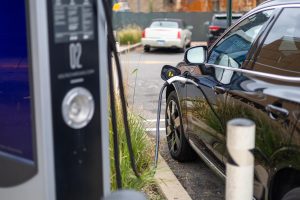Battery manufacturing plant coming to Illinois — with $530M incentive deal
By Andrew Adams Capitol News Illinois — September 26, 2023
An electric vehicle is pictured charging in Chicago. (Photo by Andrew Adams/Capitol News Illinois)
A new battery manufacturing plant is set to open in northern Illinois next year after the state offered more than $330 million in tax incentives to make it happen.
Gotion, a Chinese battery manufacturing and development company, announced on Friday that it will build a lithium-ion battery manufacturing facility in Manteno, about 50 miles south of Chicago.
The roughly $2 billion project is set to create 2,600 jobs and begin production in 2024. The plant will produce battery cells, battery packs like the kinds used in electric vehicles and large-scale energy storage systems.
Gov. J.B Pritzker on Tuesday called the development “the most significant new manufacturing investment in Illinois in decades.”
In total, the state and local governments offered Gotion more than $536 million in incentives and tax breaks, according to Pritzker’s office.
The company is the fifth to make a deal with the state under the two-year-old Reimagining Energy and Vehicles, or REV, program. Under the deal finalized on Thursday, Sept. 8, the state will provide $213 million in tax credits to the company over the next 30 years — nearly nine times more than the previous four deals combined. Gotion’s agreement is contingent on a minimum investment of $1.9 billion among other stipulations.
Gotion is also set to receive $125 million for capital funds from a $400 million pot of money overseen by Pritzker’s office that is sometimes referred to as a “closing fund.” This discretionary fund was approved by lawmakers for the current budget year, giving Pritzker the authority to offer businesses incentives to relocate to Illinois beyond those offered in other state programs.
A Pritzker spokesperson said the negotiations between the state and Gotion started approximately two years ago.
The company also worked out a deal with Kankakee County to cap the taxes paid on the approximately 150-acre property at $2 million per year for the next 30 years, according to Kankakee County Board Chair Andrew Wheeler.
The chairman of Gotion’s parent company in a statement on Friday said that the group was drawn to Illinois because of “an enabling business environment” and “a supportive state government.”
The company produces lithium iron phosphate cells for groups like Volkswagen. The German automotive manufacturer is the largest single shareholder in Gotion’s parent company, Gotion High-tech, and the two companies share a strategic framework for developing battery cells, according to Volkswagen’s 2022 annual report.
Gotion is also in the process of setting up a plant in Michigan. This has sparked controversy from Republicans in that state, who cite concerns about the company’s Chinese ownership.
Illinois Senate President Don Harmon, D-Oak Park, used Friday’s announcement ceremony to advertise Illinois to other companies looking to select locations for new developments, declaring that “Illinois is open for business.”
“We are a leader in the Midwest of clean energy job creation, putting us on the forefront of a rapidly expanding industry,” Harmon said.
Another player in the deal announced Friday was Intersect Illinois, a public-private partnership set up by former-Gov. Bruce Rauner to attract businesses to Illinois. The group’s CEO, Dan Seals, said his organization helped Gotion with site selection for its Manteno project.
“This is the biggest project I’ve seen in my years of economic development,” he told Capitol News Illinois. “It’s a big deal for the electric vehicle industry, it’s a big deal for Manteno, it’s a big deal for Illinois.”
Seals said the Manteno project’s central location in the U.S. is a key selling point for EV companies.
“Batteries have strategic value to the electric vehicle industry,” Seals said. “Batteries are heavy. Auto manufacturers don’t want to be too far and have to ship them.”
Earlier this summer, Canadian manufacturer Lion Electric opened a 900,000-square-foot factory in Joliet. The plant will focus on building electric buses and trucks and the company says it will eventually have a production capacity of 20,000 vehicles per year.
But the state has also had some misses when it comes to battery manufacturing. U.S. Sen. Dick Durbin, a Democrat from Springfield, told reporters in 2021 that there were talks with Samsung to bring a battery manufacturing plant to Bloomington-Normal.
But that plant, a partnership between Samsung and automotive company Stellantis, eventually went to central Indiana. Stellantis later “idled” its Jeep manufacturing plant in Belvidere, citing the rising costs of EV manufacturing as a contributing factor.
In addition to state efforts to court manufacturers, consumers in Illinois are increasingly turning to EVs and other battery-powered cars.
Since 2018, more than 186,000 EVs and hybrid vehicles have been licensed in Illinois, according to data from the secretary of state’s office. There were about 80,000 fully electric cars on Illinois roads as of Aug. 15, about eight times as many as there were at the same time in 2018.
The state of Illinois offers support on the consumer side of the EV equation as well. As part of the 2021 Climate and Equitable Jobs Act, the state gives $4,000 tax rebates for EVs and $1,500 on electric motorcycles.
aadams@capitolnewsillinois.com
Capitol News Illinois is a nonprofit, nonpartisan news service covering state government. It is distributed to hundreds of print and broadcast outlets statewide. It is funded primarily by the Illinois Press Foundation and the Robert R. McCormick Foundation, along with major contributions from the Illinois Broadcasters Foundation and Southern Illinois Editorial Association.







